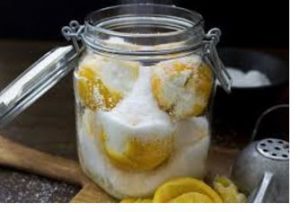Preserved lemons have an interesting picante, mellowy, sour and yet sweet flavour. For some people, they are an acquired taste.
There are a few different methods to preserve lemons. These are two, I use. I have also included the Greek method for you to try as well. See which one you prefer.
Preserved Lemons
Cut the lemons into quarters, but not right through, stopping 1 cm from the bottom, just at the base of the lemon, so the quarters are still all attached together. Place two tablespoons of rock salt into the bottom of a clean and sterilised jar. Pack extra salt inside the cut lemons and push them down into jar, flesh side down, releasing any juices, layering with tablespoons of salt between the lemon layers. Add 2 cinnamon sticks, 6 cloves of garlic, handful of peppercorns, 12 cloves, 4 bay leaves. You may also add some fresh oregano sprigs. The jar should be about ¾ full, add half a cup of lemon juice and fill the jar with boiling water. To keep the lemons submerged and seal well – see the hints below. Set aside, refrigerate if in a humid, hot climate, for at least 2 months and then use as needed. After opening, pour a layer of olive oil over the lemons and store in the fridge.
Preserved Lemons Moroccan style
This is the Moroccan method of preserving lemons. Cut the lemons into quarters, but not right through, stopping 1 cm from the bottom, just at the base of the lemon, so the quarters are still all attached together. Open the segments out and pack rock salt into the lemon. Place two tablespoons of rock salt into the bottom of a clean and sterilised jar. Pack lemons down into jar, and continue adding rock salt into the segments, push down hard to release the juices, layering with tablespoons of salt between the lemon layers as well. Do not add extra juice or water; the salt will draw out the moisture by osmosis. Set aside, for at least 2 months and then use as needed. Refrigerate them if in a humid, hot climate,
- Cut almost through
- Stuff with rock salt
- Press down firmly and over with rock salt
Hints for both these methods
It is important to keep the lemons either submerged under the juice and water, or under the rock salt topping. If the lemons are exposed to the air, they will go mouldy. In Queensland, I keep them in the fridge. They should keep up to 6 months.
It is a good idea, to make a large jar, and then decant a number of lemons from the large jar into smaller jars for your use or to give as presents. This will also ensure a longer life for the lemons in the large jar as you are not disturbing them as frequently and exposing them to the air.
To keep the lemons submerged they may need to be weighted down gently. I make a cartouche and also crumple some glad bake and place over the lemons and brine solution; then place on top a small,l clean and sterilised glass jar to weigh down the lemons and then clip on the jar lid – that keeps the lemons submerged. Set aside, refrigerate if in a humid, hot climate, for at least 2 months and then use as needed.
To use the preserved lemons
Most cooks, use the lemon zest, only, discarding the salty lemon flesh. However, the salty flesh can be stored in a jar of the oily, lemony preserving liquid and used in slow-cooked casseroles of pork or lamb. You can also rub it over a leg of lamb before baking. when using the flesh, which is very salty, do not salt your dish until it is finished cooking. Taste it first.
Take the required pieces of lemon and wash well to remove the salt. The zest, without any white pith, is then cut into fine juliennes, or according to the recipe you are using.
The most common uses are for a chicken tagine with lemons, tagines in general, and couscous. However, preserved lemons are excellent in many different dishes – such as with fish, in a stuffing for roast chicken and in salads.
The Greeks use a different method again for their preserved lemons.
Preserved lemons Greek style
These lemons are quintessentially Greek with their flavouring of rigani, Greek oregano. Use them to flavour roasts, finely chopped in stuffings or salads, or to accompany fish.
6 lemons, washed
185g coarse sea salt
6 sprigs dried Greek oregano, rigani
8 fresh or dried bay leaves
125ml extra virgin olive oil
Soak lemons, weighted with a saucer, in a bowl of cold water for 2 days, changing the water 4 times a day, then drain. Cut lemons into 8mm-thick slices, remove seeds and layer in a large plastic container, sprinkling with salt as you go. Refrigerate, covered, for 1 day.
The next day, pack lemon slices into glass jars with oregano and bay leaves, pour in the juices that have accumulated, then enough olive oil to cover lemons. Seal jars and refrigerate for 2 weeks before using.









